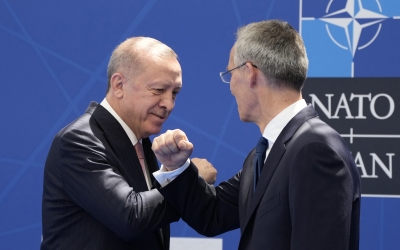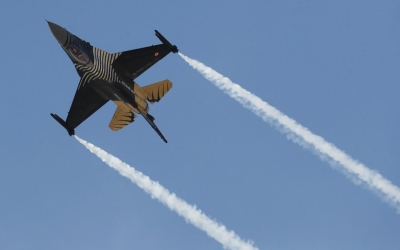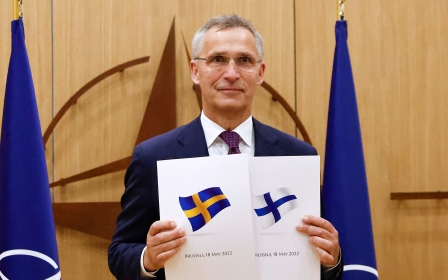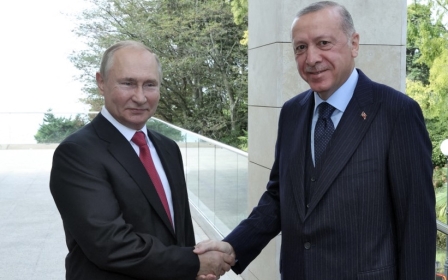Opponents of US arms sales to Turkey mobilise in Washington
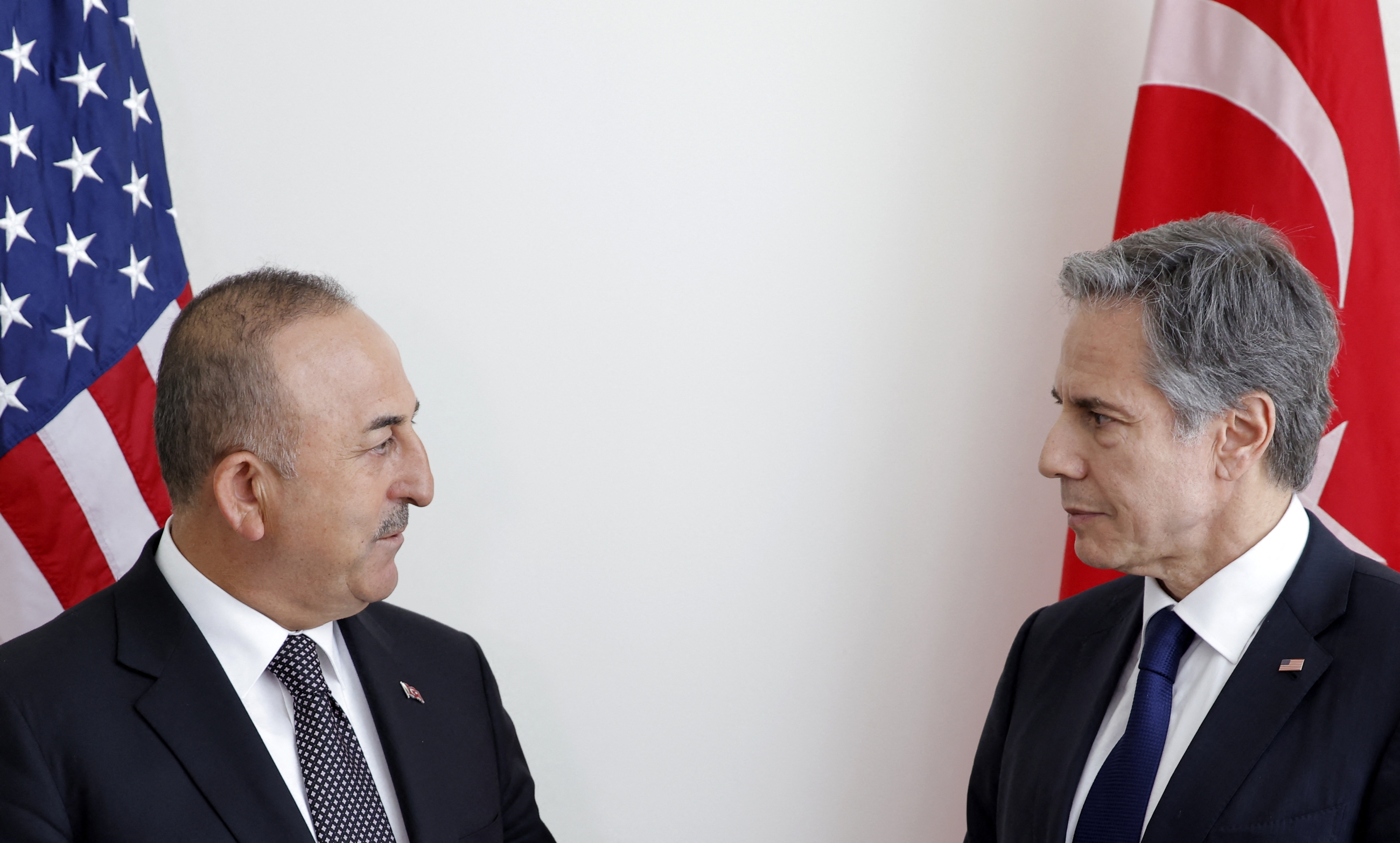
Opponents of US weapons sales to Turkey have mobilised in Washington, highlighting the uphill battle Ankara faces to complete new arms purchases despite its mediator role in the ongoing conflict between Russia and Ukraine and efforts to revive ties with the US.
"We and many others in Congress want to make sure Turkey doesn't exploit the war in Ukraine to move an arms deal through," a congressional aide who wanted to remain anonymous and whose office is deeply involved in arms sales to Turkey, told Middle East Eye.
On Wednesday, Turkish Foreign Minister Mevlut Cavusoglu held talks with US Secretary of State Antony Blinken in New York, where Turkey's request to purchase F-16 fighter jets was set to be high on the agenda.
Cavusoglu's visit came on the heels of Greek Prime Minister Kyriakos Mitsotakis' trip to Washington, where he warned Congress in an address on Tuesday against selling arms to Turkey.
Ties between Greece and the US have strengthened in recent years, while those with Turkey have frayed. US sanctions on Turkey after its purchase of the S-400 missile system from Russia have been particularly damaging to the relationship as well as continuous foreign policy differences in Syria, the Caucuses, and the Eastern Mediterranean, where Greece and Turkey are rivals.
Stay informed with MEE's newsletters
Sign up to get the latest alerts, insights and analysis, starting with Turkey Unpacked
"The last thing that Nato needs at a time when our focus is helping defeat Russian aggression is another source of instability on Nato's southeastern flank," Mitsotakis said in a potential reference to Turkey's claims of sovereignty over Greek islands and maritime borders, along with violations of its airspace.
'There is a big sense on the Hill that Turkey wants to have its cake and eat it too'
- Congressional aid
"I ask you to take this into account when you make defence procurement decisions concerning the eastern Mediterranean," he added.
Critics of a deal are galvanised by concerns that Washington may push ahead with the sale of F-16's and other equipment to Ankara as the war in Ukraine alters its geopolitical calculations.
Last month, the administration sent an informal notification to Congress asking them to approve a small weapons sale to Turkey.
The letter, first reported by the Wall Street Journal, includes a request for missiles, radar and other equipment, but is seen as a litmus test for future Congressional support of a much bigger deal.
"That letter [was] met with a lot of frustration and criticism on the Hill," the congressional aide said.
The Biden administration has already signalled its potential support for a larger deal. In March, it sent a letter to Congress saying the sale of F-16s and modernisation kits for Turkish aircraft would serve US national security interests and support Nato's long-term goals.
'Turkey has its cake'
Turkey, a Nato member since 1952 and home to the alliance's second-largest military, has emerged as a key player in the Ukraine war. President Recep Tayyip Erdogan is a vocal supporter of Kyiv's sovereignty. Ankara has sent armed drones to Ukraine and closed the Bosphorus to Russian battleships. It has also positioned itself as a mediator in the conflict.
Those moves have bolstered its image as a linchpin in the Nato alliance, recalling the Cold War era when it was a bulwark against Russia along Nato's southern flank.
"Turkey's role in Ukraine has been extraordinary across the board," James Jeffrey, a former US ambassador to Turkey, now with the Wilson Center, told MEE.
"The conflict has driven home the point to everyone that if the US wants to go up against the big boys in this region, like Iran and Russia, we [the US] need Turkey in our corner," he added.
That strand of thinking is not lost on Ankara, which has been quick to try and leverage Turkey's actions in Ukraine to achieve results in other policy areas.
In March, Erdogan told Biden in a phone call to lift "unjust" sanctions on Turkey's defence industry and speed up the sale of F-16 fighter jets.
Turkey was removed from the US's F-35 fighter jet programme in 2019, after it acquired the Russian S-400 anti-missile system and was sanctioned under the Countering America's Adversaries Through Sanctions Act (Caatsa) in 2020.
On Wednesday, Turkey showed a new willingness to use its clout in Nato by blocking the start of talks on Finland and Sweden’s accession to the alliance.
Ankara is demanding the states extradite 30 government opponents and crack down on Kurdish separatists and militants living inside the countries in return for its backing to join Nato.
While Turkey has long expressed frustration with the two states for harbouring Kurdish opponents, analysts say it could be using the ascension talks to better position itself to strike a bargain for future arms sales with the US as well.
"They [Ankara] could walk back opposition or eventually reach an agreement with the countries to show that they are willing to work with Nato and the US, and in exchange get something done on the F-16," Soner Cagaptay, director of the Turkish research programme at the Washington Institute for Near East Policy, told MEE.
But for many in Washington, Turkey's vacillation on the Nato talks amid war in Europe is further evidence of its unreliability as a partner and one more reason to prevent arms sales.
"There is a big sense on the Hill that Turkey wants to have its cake and eat it too," the Congressional aide said, also referencing Ankara's reluctance to impose sanctions against Russia. Unlike other Nato members, Turkey remains open to business for Moscow, and has become a haven for Russians looking to escape sanctions.
"What lawmakers are asking is, 'Why does Turkey get to be a special case on all these matters?'" the aide added.
Defence driven relationship
Talk of Washington striking a grand deal with Ankara is what worries Turkey's neighbours and minority groups along its border, in addition to their proponents in Washington.
In Greece and Cyprus, many still believe the US turned a blind eye to Turkey's 1974 invasion of the Eastern Mediterranean island to appease its Cold War ally.
Meanwhile, the US's Kurdish allies are still dealing with the fallout from former President Donald Trump's decision to green-light Turkey's 2019 invasion of northern Syria.
Greek, Kurdish and Armenian groups have historically opposed weapons sales to Ankara, and Congress' restrictive approach to new deals over the last few years has been a victory. This time they are particularly attuned to the narrative that the war in Ukraine should change Washington's calculus.
In a letter sent to Biden on Friday, and reviewed by MEE, the American Hellenic Institute called arms sales to Turkey "the height of strategic malpractice".
"Turkey has masqueraded its closeness with Russia as an asset, pitching itself as a 'mediator' between Russia and Ukraine. However, Turkey is more of a 'fence-sitter,' rather than a mediator," the letter added.
The more than 130 strong Congressional Hellenic Caucus has long spearheaded opposition against arms sales to Turkey and in the past week, members have quickly turned out to criticise a potential deal.
Republican Congressman Gus Billirakis, who co-chairs the group, said he was "vehemently opposed to any sale" of weapons to Turkey; while Democratic Congressman Chris Pappas said that he would work "to prevent F-16s or any other American-made weapons from falling into Erdogan's hands".
"This sale will only embolden him (Erdogan) and give him the resources to continue his war-mongering initiatives in the Caucasus and beyond," Armenian Caucus co-chair and Democratic Congressman Frank Pallone said in another statement on Friday.
Besides the House, new weapons sales also face opposition in the Senate, including from members of President Biden's own party.
Senator Chris Van Hollen is a noted critic of Turkey’s actions in the Eastern Mediterranean and last year joined with a bipartisan group of lawmakers to condemn democratic backsliding in Turkey.
The most prominent Turkey sceptic is Democrat Bob Menendez, who chairs the powerful Senate Foreign Relations Committee. He said last year: "I personally am not supportive of giving them [Turkey] F-16s," but has yet to speak publicly on the topic since the invasion of Ukraine.
The Biden administration is expected to formally notify Congress of the F-16 sale later this year, with analysts saying it could set the stage for a do or die moment in the relationship.
"US-Turkey ties are mainly defence driven. They are not determined by cultural proximity or deep trade and diaspora linkages," Cagaptay said. "The F-16 is what will sustain it."
Advocates of closer cooperation between the two countries say getting a deal over the finish line will require the Biden administration to lobby Congress hard, particularly Menendez, who has the ability to review arms sales as head of the Foreign Relations Committee.
"This administration understands why Turkey is important for strategic reasons, but whether they do what it takes tactically is another matter," Jeffrey said. "If they want this deal there is going to have to be serious White House engagement on the Hill."
Middle East Eye delivers independent and unrivalled coverage and analysis of the Middle East, North Africa and beyond. To learn more about republishing this content and the associated fees, please fill out this form. More about MEE can be found here.


